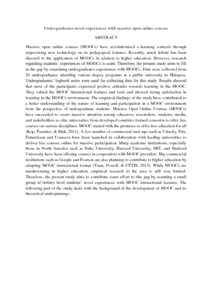Citation
Hasan, Md. Masudul and Tan, Bee Hoon
(2015)
Undergraduates novel experiences with massive open online courses.
East West Journal of Humanities, 5.
pp. 39-49.
ISSN 2074-6628
Abstract
Massive open online courses (MOOCs) have revolutionized e-learning contexts through improvising new technology on its pedagogical features. Recently, much debate has been directed to the application of MOOCs in relation to higher education. However, research regarding students’ experiences of MOOCs is scant. Therefore, the present study aims to fill in the gap by examining undergraduates experiences with MOOCs. Data were collected from 29 undergraduates attending various degree programs at a public university in Malaysia. Undergraduates’ logbook notes were used for collecting data for this study. Results showed that most of the participants expressed positive attitudes towards learning in the MOOC. They valued the MOOC instructional features and tools and showed strong satisfaction in learning in the MOOCs environment. The empirical findings of the study have contributed to a better understanding of the nature of learning and participation in a MOOC environment from the perspective of undergraduate students. Massive Open Online Courses (MOOCs) have succeeded to create massive attention among educators, researchers, students, media, and stakeholders as elite universities from developed countries formed consortia to offer free courses on various disciplines. MOOC started with the promises to offer free education for all (Kop, Fournier, & Mak, 2011). A few number of commercial start-ups such as Udacity, Edx, Futurelearn and Coursera have been launched in collaboration with leading universities to deliver free courses online for massive participation. Many academic institutions, especially those in North America such as Duke University, Harvard University, MIT, and Stanford University have been offering courses in cooperation with MOOC providers. Big commercial institutions such as Google and Pearson are also planning to contribute to higher education by adopting MOOC instructional format (Yuan, Powell, & CETIS, 2013). While MOOCs are mushrooming in higher education, empirical research in the area is still very limited. Therefore, the present study aims to contribute some effort to this gap by scanning a small group of tertiary level students’ novel experiences with MOOC instructional features. The following part of the study deals with the background of the development of MOOC and its theoretical underpinnings.
Download File
![[img]](http://psasir.upm.edu.my/46790/1.hassmallThumbnailVersion/Undergraduates%20novel%20experiences%20with%20massive%20open%20online%20courses.pdf)  Preview |
|
PDF (Abstract)
Undergraduates novel experiences with massive open online courses.pdf
Download (75kB)
| Preview
|
|
Additional Metadata
Actions (login required)
 |
View Item |

